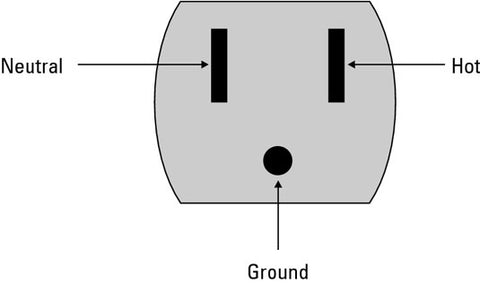Need a power supply? Check out our selection here.
What is a “Ground” connection for power supplies? Do I need one for my LED Lights
The ground connection is the third prong on some plugs, not the two flat pieces, but the little rod, that's the ground connection in AC power cables for LED strip light Power Supplies, Power Adapters, and LED Drivers. 
Grounding is a safety feature for AC wiring that can absolutely save your life during a power surge or a storm, as it redirects all that excess energy into the ground where it is safely discharged, instead of turning you into a lighting fixture. In recent years, the National Electric Code made grounded outlets a mandatory part of home AC wiring systems. So if your home was built since 2011, then you have grounded outlets in your home. If you're trying to figure outwhether or not your outlet is grounded, count the connections! Three means it's grounded, two means it's not!
Can I use “Cheater” plugs to use my Grounded power supply in an ungrounded outlet?

If you've got a cheater plug, then sure, go ahead and use one! It should definitely be noted though that a cheater plug removes the purpose of even having a ground connection, so make sure that you're comfortable with taking the risk. However, you still can use a cheater plug with no downside for most of our products if the only outlets available to you are are ungrounded two prong outlets. In a general sense though, cheater plugs are not really necessary for Hitlights products as most of our products do not need grounding, and we offer ungrounded power supplies in addition to grounded ones. So really whether you ground or not is up to you and your safety choices.
Editor's note : While the information in this article is still valid, we generally no longer recommend the use of 'cheater plugs'. The ground connection is there for a reason.
Will using a cheater plug or ungrounded connection affect my lights' performance?
Nope! Power is power and our LED light products won't discriminate between grounded and ungrounded power so long as it's coming through an adapter. A.K.A. as long as you're feeding it DC power your lights will work just fine, grounded or not. The only way a cheater plug or an ungrounded connection will affect your lights is if a power surge blows your lights out! So if you've grown attached to your lights or your loved ones, then using a grounded outlet is the better option, though it is still your choice to make. We here at Hitlights want you to always be as safe as you can, so think twice about using ungrounded outlets.
Which Power supplies need to be grounded?
Here's where I wish I could just say, "X, Y, and, Z Power Supplies need grounding! Peace, we out!" Alas, I cannot in good consciousness do that, you deserve better! If you want me to be technically and straight with you, only 12 volt dimmable drivers MUST, I reiterate, MUST be grounded. So if you're using a dimmable driver, ignore the entirety of questions two and three, they're both liars and want you to break your products. I don't want that to happen, trust me and ground your dimmable drivers. We also have three other power supplies that greatly benefit from being grounded. The 150 Watt, 192 Watt, and 350 Watt power supplies have terminals for grounding wires, so please use them. It's a matter of safety, so think about that every time you consider going with the ungrounded option because of "convenience."
Which Power supplies don’t need to be grounded?
Just like dentists say to only brush the teeth you want to keep, I'll say only ground the power supplies you want to keep. While the 12 volt dimmable driver is the only one that straight up REQUIRES grounding, you really should ground them all. That being said, every rule has exceptions, and this one has three. Our indoor 24 Watt and 60 Watt power supplies both use ungrounded connections so in those cases don't worry too much about grounding. The third exception is the waterproof 60 Watt power supply.
The reasoning behind this is pretty simple. If there's a power surge and your lights are underwater, the extra energy isn't going to worry about going into the ground, it's headed straight for that H2O. That being said, if your waterproof power supply ISN'T underwater, still be careful with it as YOU are now the grounding connection while handling it. Stay safe with your LED lights and power supplies, ground when you can and always be thinking about safety when working with electronics!
Need more advice on LED lighting projects? Our free eBook, titled 'How to Choose LED Strip Lights' is an ideal guide in the next stage of your LED lighting journey.
 ---
---Thanks for reading this installment of our troubleshooting series, we truly hope it has been helpful. Our customer service staff (customerservice@hitlights.com) is happy to assist you with any and all of your concerns, questions, and suggestions.
 Skip to content
Skip to content


1 comment
Phil
you are the master. my house was built in 1963. I cant find a ground. all outlets I’ve opened have no ground.. thank you for your info.